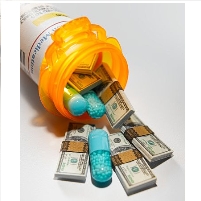Delaying Generic Drugs Costs Consumers Billions
Friday, February 05, 2010

They cost consumers billions of dollars and have been ruled illegal by a federal court, and yet pay-to-delay agreements in the pharmaceutical industry are still in use. Pay-to-delay refers to deals in which one drug manufacturer with a name-brand product funnels a share of its profits to another drug maker to keep it from producing a generic equivalent. The scheme represents a win-win for both companies involved, as the one with the name-brand continues to enjoy dominance in the market while the generic maker gets paid to do nothing.
However, Americans lose out on access to cheaper drugs this way. According to a new report from the Federal Trade Commission (FTC), consumers can end up paying 90% less for generic versions of drugs, when they are available. Without them, the annual cost to Americans can be as high as $3.5 billion.
In 2003, an appellate court ruled that pay-to-delay agreements were illegal because they violated federal anti-trust laws. But subsequent court cases have “misapplied the antitrust law to uphold these agreements,” according to the FTC.
The FTC is recommending to Congress that lawmakers pass legislation banning the practice of pay-to-delay.
-David Wallechinsky
Pay-for-Delay: How Drug Company Pay-Offs Cost Consumers Billions (Federal Trade Commission) (pdf)
Health Care Reform Bill Helps Pfizer and Merck, but Hurts Generics (by David Wallechinsky, AllGov)
- Top Stories
- Unusual News
- Where is the Money Going?
- Controversies
- U.S. and the World
- Appointments and Resignations
- Latest News
- Musk and Trump Fire Members of Congress
- Trump Calls for Violent Street Demonstrations Against Himself
- Trump Changes Name of Republican Party
- The 2024 Election By the Numbers
- Bashar al-Assad—The Fall of a Rabid AntiSemite






Comments